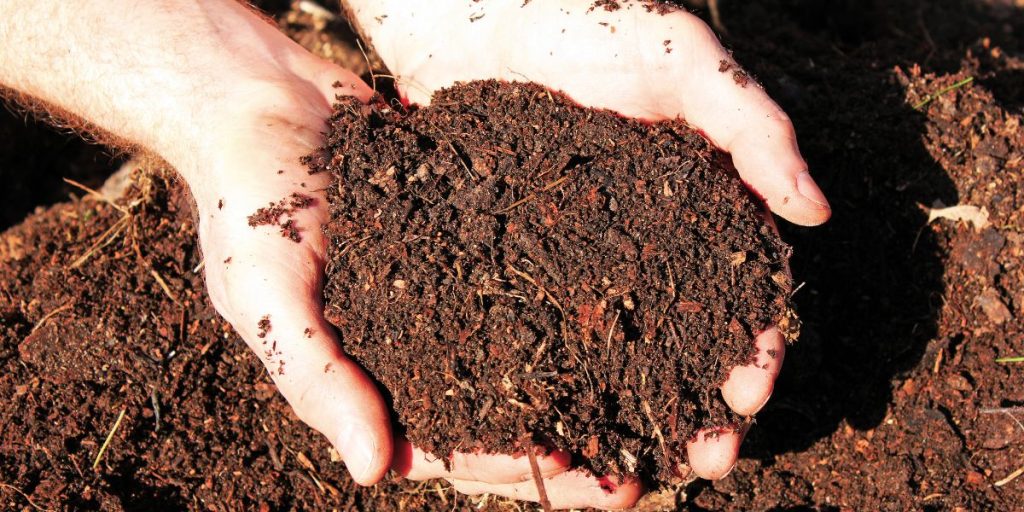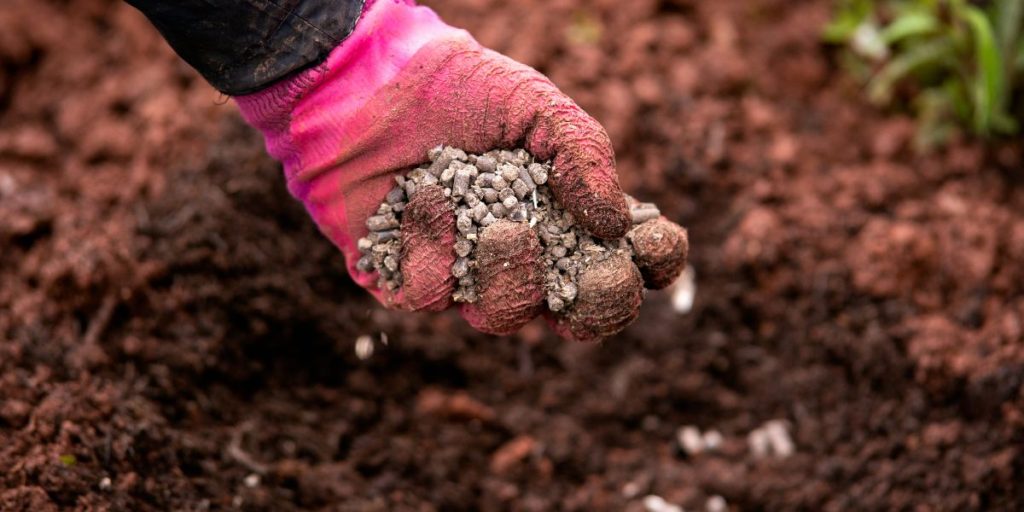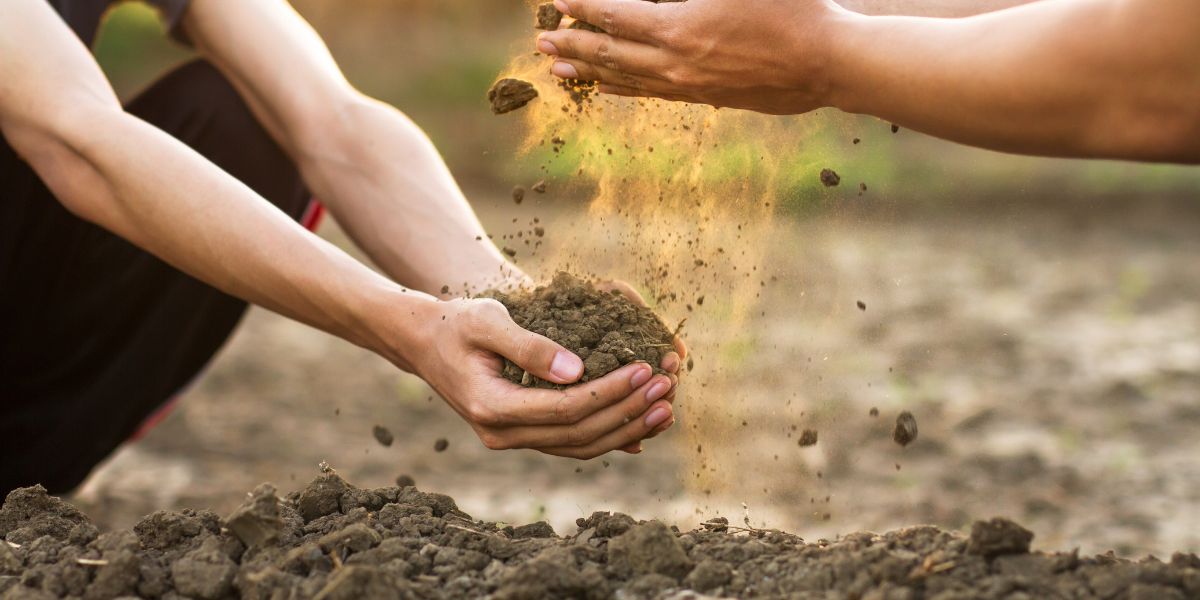To ensure safe use, chicken manure must be handled and aged properly in order to be an effective soil amendment and fertilizer. It contains high nitrogen, phosphorus, and potassium, essential plant nutrients. However, fresh chicken manure can contain harmful bacteria and parasites that can cause human health problems if not managed correctly.
The “downside” to using chicken manure in the garden is its high nitrogen content, which can burn plants if applied directly to the soil without aging or composting first. The solution for hot, fresh chicken manure is to age it by spreading it out on a tarp or other surface and allowing it to dry out before adding it to the soil.
Composting also helps reduce the risk of burning plants and killing off any harmful bacteria or parasites present in the manure. Composting also helps break down the nutrients in the manure, making them more readily available to plants when added to the soil. When used correctly, chicken manure can be a great natural fertilizer for your garden.
Table of Contents
Chicken Coop Manure Harvesting
Harvesting manure from your chicken coop is an easy and effective way to fertilize your garden. In order to prevent contamination of the manure, the coop must be kept clean and free of food scraps and other materials.
This can be done by regularly cleaning the coop and removing debris. Once the coop is clean, you can begin turning the pile as needed to aerate it and help break down the material. Afterward, transport the manure to your garden by scooping it up and placing it into a compost bin, bucket, or wheelbarrow.
Chicken manure should be mixed into the soil when planting or existing top-dressing plants. It’s important not to use too much at once, as this can cause the burning of delicate plants. With a little effort, you can turn your chickens into valuable resources for your garden by harvesting their manure for use in your garden beds.
Not only will this provide essential nutrients for your plants, but it will also help reduce waste from your chicken coop while providing you with an organic fertilizer option that won’t harm the environment.
| Aspect | Benefits of Chicken Manure for Gardens |
|---|---|
| Nutrient-Rich | Chicken manure is a valuable source of essential nutrients for plants. It contains high levels of nitrogen, phosphorus, and potassium, which are crucial for healthy plant growth. |
| Organic Matter | Chicken manure is an excellent source of organic matter, which improves soil structure, water retention, and aeration. It also enhances microbial activity in the soil. |
| Cost-Effective | Chicken manure is often readily available, making it a cost-effective fertilizer option for gardeners. Many poultry keepers are willing to provide it for free or at a low cost. |
| Slow Release Nutrients | Unlike synthetic fertilizers, chicken manure releases nutrients slowly over time, reducing the risk of nutrient runoff and ensuring a continuous supply of nutrition to plants. |
| pH Adjustment | Chicken manure can help adjust soil pH levels, making it suitable for a wider range of plants. It is slightly alkaline, which can counteract acidic soils in certain cases. |
| Weed Suppression | The application of chicken manure can help suppress weed growth due to its ability to create a dense, nutrient-rich surface layer in the soil that makes it difficult for weeds to establish. |
| Microbial Activity Boost | Chicken manure introduces beneficial microorganisms into the soil, enhancing its overall health and reducing the risk of soil-borne diseases. |
| Environmental Impact | Using chicken manure in gardens can reduce the environmental impact of poultry farming by recycling waste and preventing pollution from runoff. |
| Composting Potential | Chicken manure can be composted to create nutrient-rich compost, providing an even more balanced and safe fertilizer for your garden. |
| Caution Required | Fresh chicken manure is high in ammonia and can burn plants if not properly composted or aged. It should be used cautiously and never applied directly to plants. |
How Much Chicken Mansure Should I Use?
When using chicken manure, it is important to use the right amount for your plants and soil type. It is best to put chicken manure on vegetables as a side or top dressing rather than directly on the plant itself. The amount you should use depends on the type of plants you are growing and the soil condition, but a good rule of thumb is to apply about one pound per square foot of garden space.
Before applying chicken manure to a garden, it should always be fully composted. Fresh manure can damage plant roots, so ensure that any chicken manure you use has been properly composted first. With these tips in mind, you can easily add chicken manure to your garden in order to give your plants the nutrients they need for healthy growth.

How to Use Chicken Manure in My Garden?
Chicken manure has many essential nutrients, including nitrogen, phosphorus, and potassium. However, you need to use it correctly to get the best out of it. There are 3 ways to compost chicken manure in the garden such as:
Cold Composting
Cold composting involves piling up the organic material in a heap or bin and allowing it to decompose over time. This process takes much longer than hot composting, but it is still effective in breaking down the materials into usable soil. The manure can be safely used in your garden after a year of cold composting.
The ratio of bedding to manure depends on the type of bedding used. You will probably use at least a 1:1 carbon: nitrogen ratio (wood chips or shavings, cardboard, dry leaves, etc.) since chicken manure is so high in nitrogen.
Another method of cold composting with chicken manure is deep litter bedding in a coop or run. This involves spreading the manure on the coop floor or run and allowing it to decompose naturally over time.
This form of cold composting also takes longer than hot composting, but it can be done without building a separate bin or heap for the materials. The result is nutrient-rich soil that can be used in your garden confidently.
Hot Composting
Hot composting is an effective way to quickly break down chicken manure and reduce the risk of contamination. The process involves heating the manure to at least 130 F for at least 15 days, which kills most pathogens and accelerates the decomposition process.
This heat can also be used in a hotbed, where chicken manure and straw or wood chips are contained below an area of compost or topsoil. Seeds or plants can then be placed in this bed, allowing winter growing. Hot beds are especially useful in colder climates, as they provide warmth and insulation for the plants.
The benefits of hot composting go beyond just reducing contamination risks and providing warmth for winter growing. It is also a great way to recycle organic material that would otherwise end up in landfills.
By breaking down the material quickly, it can be reused as fertilizer or soil amendment much sooner than with other methods of composting. Additionally, it helps reduce odors associated with chicken manure by speeding up the decomposition process. Hot composting is an efficient way to use chicken manure while protecting our environment from potential contaminants.
Liquid Fertilizer
It is possible to make a liquid fertilizer out of composted chicken manure that provides nitrogen-hungry leafy crops with a quick boost during the summer. This fertilizer combines some of the compost with water, creating a nutrient-rich tea that can be applied directly to your plants.
Unlike using chicken manure as a mulch or top dressing, which releases nutrients slowly over time, liquid fertilizer works more quickly.
This makes it ideal for giving your plants an extra boost when they need it most. It’s also easy to apply and requires no special equipment or tools. With just a few simple steps, you can create your homemade liquid fertilizer from chicken manure and give your garden the nourishment it needs.
Benefits of Chicken Manure
Chicken manure is an incredibly valuable resource for home gardeners. Although it is too strong to be used raw, once it is composted, it can provide a number of benefits to your garden. The applicability of composted chicken manure increases the capacity of soil to hold water and provides beneficial microorganisms.
It also provides essential nutrients such as nitrogen, phosphorus, and potassium for healthy plant growth. These nutrients are more concentrated than those found in other types of manure, such as horse, cow, or steer manure.
Using composted chicken manure in your garden will help you create a healthier environment for your plants and flowers. Not only does it provide essential nutrients, but it also helps improve the structure of the soil by adding organic matter, which increases its ability to hold water and beneficial biota.
This makes it easier for plants to absorb the nutrients they need from the soil and encourages healthy root growth. Additionally, using chicken manure can help reduce weeds and pests in your garden while providing an all-natural fertilizer that won’t harm the environment or your plants.
Some Downside
Using chicken manure in the garden can greatly add nutrients and nitrogen to the soil. However, it is important to know the potential “downside” of using this manure. Chicken manure is considered “hot”, meaning its high nutrient content can burn plants and their roots when too fresh. To avoid this, it is best to wait until the manure has aged or been composted before applying it to your garden.
Salmonella and bacteria can also reside in chicken manure. While this is true for any manure, it is still important to take precautions when handling chicken manure. It should always be handled with gloves and washed off thoroughly after use. If you are concerned about safety, you may consider using a different fertilizer in your garden instead.

Can chicken manure be Bad for Plants?
Plants have been fed chicken manure for centuries, but its powerful properties make it potentially harmful to plants as well. It is a mixture of both poop and liquid that is high in ammonia, and it is wet and stinky.
The smell of chicken manure is caused by ammonia breaking down into nitrogen. Nitrogen boosts plant growth in all plants. The branches of fruit trees that receive too much nitrogen grow rapidly at the expense of the flowers. If there are no flowers, there will be no delicious fruit. Chicken manure that has not been composted should not be used to fertilize fruit trees.
Frequently Asked Questions [FAQs]
1. Should I mix chicken manure with soil?
When it comes to using chicken manure in your garden, the answer is yes: you should mix it with soil. Nitrogen and other essential nutrients can be found in chicken manure, which can aid in the growth of healthy plants. It also helps improve soil structure and drainage, benefiting plants that require well-drained soils.
2. How often should I use chicken manure in my garden?
It depends on the type of plants you grow, the soil conditions in your garden, and how often you should use chicken manure. Generally speaking, it is best to apply a light layer of composted chicken manure once or twice a year. This will help give your plants the nutrients they need without overloading them.
3. Can Chicken Manure Be Bad for Plants?
Plants have been fed chicken manure for centuries, but its powerful properties make it potentially harmful to plants. It is a mixture of both poop and liquid that is high in ammonia, and it is wet and stinky. The smell of chicken manure is caused by ammonia breaking down into nitrogen. Nitrogen boosts plant growth in all plants. Branches grow vigorously at the expense of the plant’s root system, which can cause the plant to become top-heavy and topple over.
4. What are the disadvantages of poultry manure?
One of the main disadvantages of poultry manure is that it can contain high levels of pathogens and parasites. These can be harmful to both plants and humans if not handled properly. It’s important to wear gloves when handling poultry manure and to keep it away from children and pets. Additionally, poultry manure can be high in salt content, damaging plants if not used properly.
5. How much NPK is in chicken manure?
In fresh chicken manure, nitrogen and phosphorus range from 0.5% to 0.9%. Potassium is present in the range of 1.2% to 1.7%. The monthly manure output of an individual chicken is approximately 8 to 11 pounds (3.6 to 5.0 kilograms). Fertilizers can be made from chicken manure.
6. Which is better, cow manure or chicken manure?
The nitrogen, phosphorous, and potassium content of poultry droppings is higher than that of cow dung (or other farmyard manure). These elements are the most deficient in Indian soils. The amount of fresh dropping produced by poultry (on a wet-weight basis) is about twice that produced by the amount of fuel they consume. Feed and water are consumed about equally by birds.
Conclusion
Chicken manure is a great source of nitrogen and other essential nutrients for your garden, but it should be used cautiously. Mix it with soil and use it sparingly, as too much can damage plants. Additionally, poultry manure can contain high levels of pathogens and parasites, so it’s important to wear gloves when handling it and keep it away from children and pets. Other than that, it’s safe to use.

